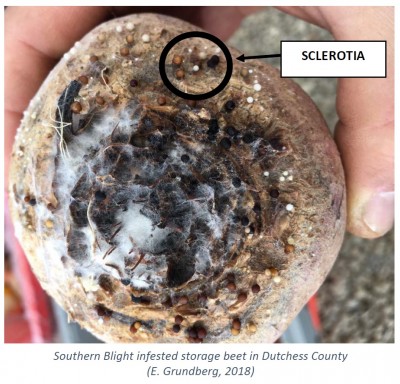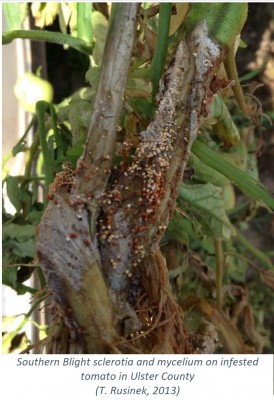Be on the Lookout for Southern Blight
Ethan Grundberg, Vegetable Specialist
Eastern New York Commercial Horticulture
Southern Blight is caused by the fungal pathogen Sclerotium rolfsii and has historically only been a concern to growers in southern states. However, Cornell pathologist Dr. Sarah Pethybridge has seen an
increase in the incidence of Southern Blight in New York over the past several years. This winter, Dr. Pethybridge confirmed the presence of S. rolfsii on golden storage beets in Dutchess County. Given the broad host range of the pathogen that includes over 1,200 crops and weeds, it is imperative that growers who suspect a possible Southern Blight infestation on their farm contact extension to confirm the diagnosis to assist with optimizing crop rotations to reduce soilborne inoculum.
The most common symptom observed in the field is wilting or collapse of the plant. Upon closer inspection, affected plants often have reddish-brown dry lesions at the soil line. Fungal mycelium is also usually present as a thick white mat around the base of the stem. The Southern Blight pathogen also produces overwintering bodies called sclerotia under the right environmental conditions (typically high humidity with temperatures about 80 °F, but sclerotia were found on beets in cold storage at 40 °F). The sclerotia formed by S. rolfsii are a key identifying feature; they are small balls similar in appearance to Dijon mustard seeds that change in color from white to golden to reddish-brown (see image). These sclerotia can survive in the soil for years and endure temperature extremes and drought while waiting to germinate in the presence of a host plant under the right environmental conditions.
Crops that are most commonly affected by Southern Blight are tomatoes, peppers, snap beans, onions, garlic, and Jerusalem artichokes; however, as indicated above, the pathogen can grow and reproduce on a much broader range of plants. Like with most diseases, early detection and proper identification are critical! Infested plants should be removed and destroyed if possible. Symptomatic plants should NOT be placed in compost, as they may contain sclerotia that will then be spread with the compost to other fields. Some small grains and corn are less susceptible to Southern Blight and can be used in rotation in heavily infested fields, but crop rotation is typically not a viable strategy for management of this pathogen given its broad host range. Initial research in New York suggests that deep plowing of infested fields to bury sclerotia and infested residue at least 6-inches deep can lower the pathogen's survival rate.
Several effective chemical controls are available to conventional growers, but they must be applied preventatively. Labeled formulations of azoxystrobin (Quadris), pyraclostrobin (Cabrio), and penthiopyrad (Fontelis) have been effective for growers in the south. Some research has suggested that OMRI-approved biocontrol agents, such as Trichoderma harzianum (RootShield, TerraGrow) and Gliocladium virens (SoilGard), may also help reduce the number of Southern Blight sclerotia and prevent colonization of host plant tissue by the pathogen.



Upcoming Events
Vegetable Pest and Cultural Management Field Meeting for Auction Growers -- Finger Lakes Produce Auction
July 18, 2025
Penn Yan, NY
This evening meeting will demonstrate pest management in fresh market vegetables in both field and greenhouse (high tunnel) vegetables, primarily for those growing for wholesale auction. A hands-on demonstration of weed, insect and disease identification in vegetables including management options. Details on each topic will focus on field observations at the farm.
Lake Erie Region Summer Meeting
July 24, 2025
Brant, NY
This meeting will cover organic and conventional management and will be relevant for producers of all sizes. This broad-reaching meeting will feature a mixed fresh market field walk, potatoes, sprayer calibration, and disease control in table and wine grapes. We'll cover organic and conventional controls and present information for growers of all scales of production.
2.0 DEC (0.5 CORE, 1.0 Veg, 0.5 Fruit)
Vegetable Pest and Cultural Management Field Meeting for Auction Growers -- Seneca Produce Auction
July 30, 2025
Romulus, NY
This evening meeting will demonstrate pest management in fresh market vegetables in both field and greenhouse (high tunnel) vegetables, primarily for those growing for wholesale auction. A hands-on demonstration of weed, insect and disease identification in vegetables including management options. Details on each topic will focus on field observations at the farm.
2.0 DEC credits in categories 10, 1a, 23, and 24.


































